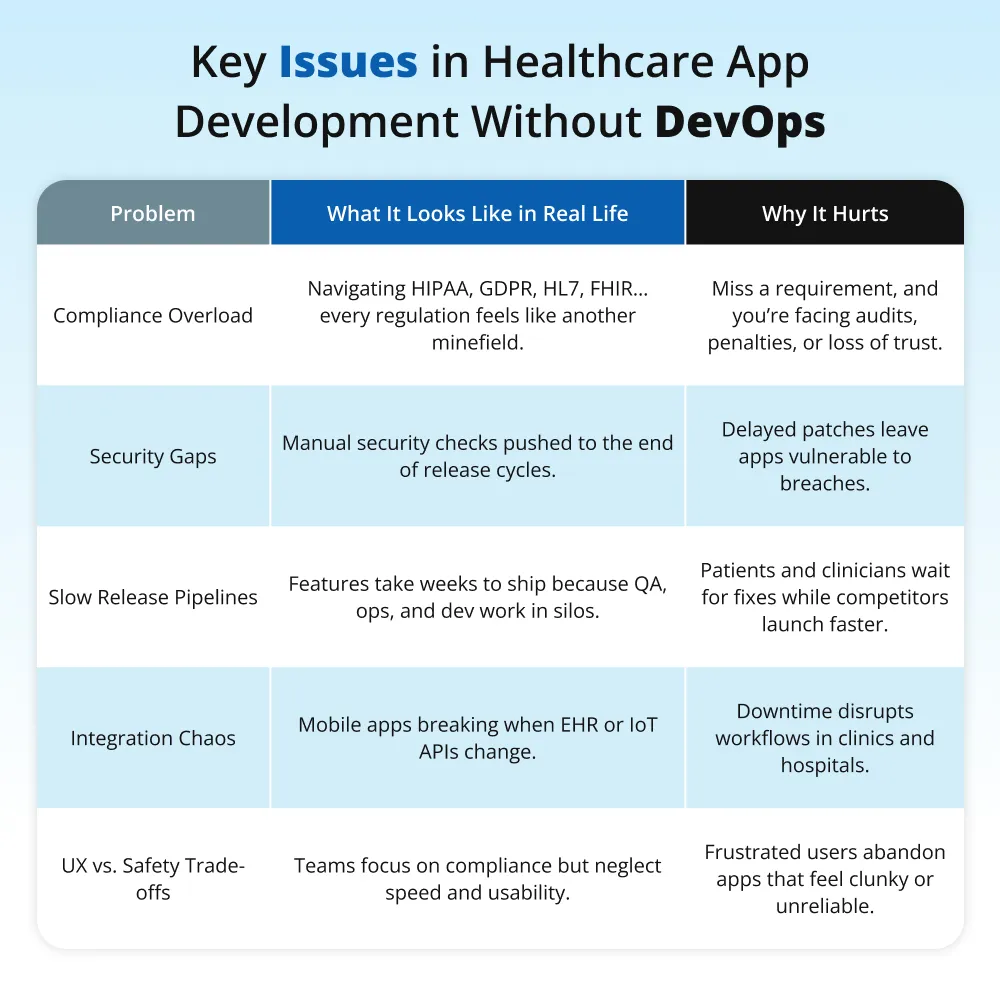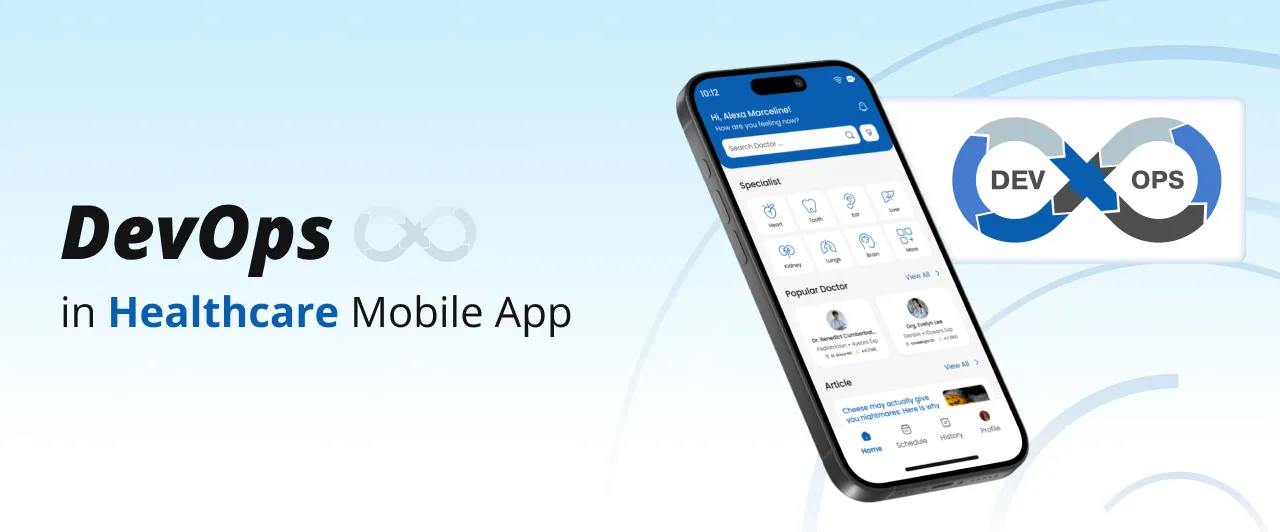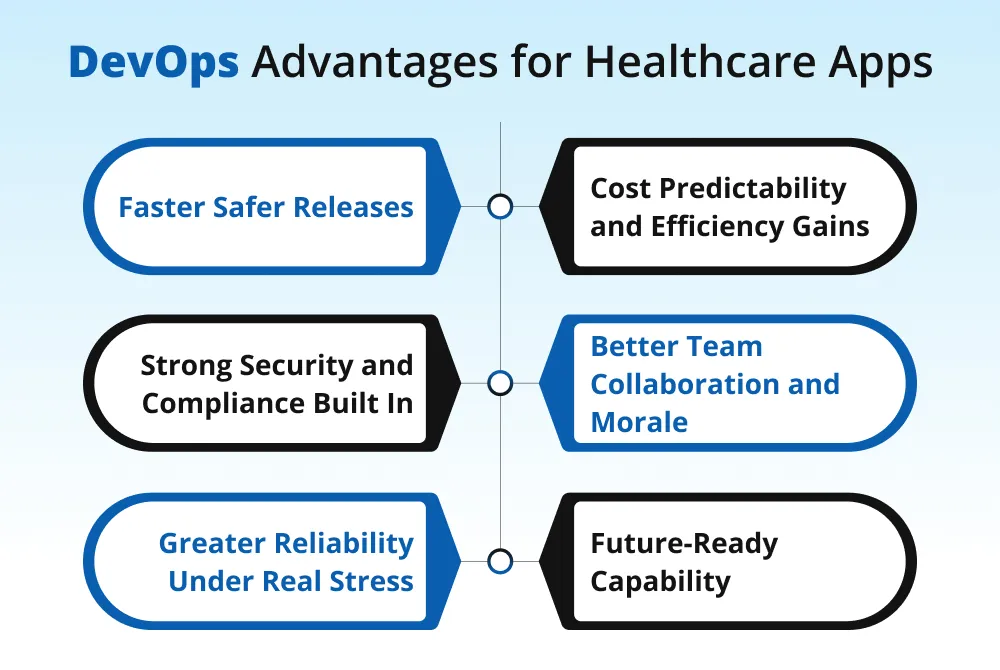



Healthcare apps aren’t just software, they’re lifelines. When things go wrong, people get hurt, data is exposed, trust is broken. If you’re working in healthcare tech, you’ve probably seen the stakes firsthand: a client unable to access patient records, an insecure API, a mandated update delayed for weeks. It all adds up. That’s why DevOps in healthcare has moved from theory to necessity.
In this post, we will share what we have learned from shipping regulated health apps, how proper DevOps consulting can help, what benefits really matter, and where teams trip up. If you're looking to transform healthcare with DevOps, this is for you.
It’s not just you: healthcare apps come with extra weight. First, compliance rules like HIPAA, GDPR, HL7 change often and being out of line isn’t just bad press, it’s a major liability. Second, security threats aren’t hypothetical; breaches happen, and the fallout is real.
Third, mobile apps must integrate with everything from EHR systems, wearable devices, lab systems and any mismatch breaks workflows. Fourth, clinicians and patients both want simplicity and speed, while teams behind the scenes juggle regulations, audits, and downtime.
These are real hurdles, and DevOps consulting isn’t magic but it offers a roadmap out.

Having helped teams adopt DevOps in healthcare, I’ve seen what makes the difference:
When DevOps consulting is done well in healthcare, teams stop reacting. They become proactive. They move faster without cutting corners.
These are the real advantages we have observed, not just what people talk about, but what actually moves metrics and improves outcomes.

With DevOps, the time between writing code and getting it into patients’ hands drops dramatically. Feature flags, canary deployments, automated testing let you ship updates without fear. You don’t wait months for feedback, you iterate in weeks or even days.
When compliance is integrated into dev pipelines, audits become less painful. Security isn’t a late-night scramble. Encryption, access controls, audit logs, policy checks, everything baked into how you build and release.
Healthcare apps have usage peaks: flu season, emergencies, remote patient monitoring surges. Devops helps apps hold up under load by using auto-scaling, robust monitoring, and fallback strategies. Patients don’t see downtime, and clinicians don’t lose trust.
Manual QA, manual deployments, firefighting issues all cost time and money. Automation cuts down repeatable tasks. Infrastructure as Code prevents misconfigurations. Over time, teams spend more on innovation, less on patching leaks.
When dev, ops, security, and compliance walk together, communication improves. Everyone understands what “ship safely” looks like. Fewer surprise fire drills. More shared ownership. That makes for better products and more sane working hours.
If you’re thinking ahead, DevOps gives you room to adopt IoT, AI/ML, predictive analytics. Model updates, device integrations, new standards, these are easier when your delivery system is built for flexibility and safety.
Here are a few instances we have seen or heard that show the benefits in motion:
Figuring out DevOps in healthcare on your own is possible, but it takes longer and costs more. Consultants bring experience, they’ve run pipelines, dealt with audits, tried containerization, defined rollback plans. They help you avoid common traps, adopt tools that match your regulatory environment, and embed global standards from the start.
When you work with someone who knows the terrain, you get traction faster, with fewer headaches and fewer late-night fixes.

Healthcare apps aren’t just software—they’re lifelines. In this episode, we break down how DevOps consulting transforms healthcare mobile apps with faster, safer releases, stronger compliance, and improved reliability. If you’re exploring DevOps in healthcare, this podcast is your roadmap to building secure, scalable, and future-ready apps.
Healthcare apps can’t afford slow updates, compliance slip-ups, or unreliable performance. Patients, clinicians, and regulators all expect apps to work seamlessly, stay secure, and keep evolving as technology advances. DevOps gives healthcare teams the tools and processes to meet those expectations resulting in faster releases, stronger security, and apps that can handle real-world demands without drama.
If you’re exploring how to bring DevOps in healthcare or need DevOps consulting for your next healthcare mobile app, talk to our experts at VT Netzwelt. We help organizations transform healthcare with DevOps by combining global standards with practical experience.
Are You Prepared for Digital Transformation?
Mobile App Development
Looking for profitable mobile app ideas for startups in 2026? Explore trending ideas and hire expert mobile app development services in the USA.
Mobile App Development
How much does Flutter app development cost in the USA in 2026? See real price ranges, app category costs, and US pricing for startups and enterprises.
Mobile App Development
Planning to hire Android developers? This guide covers costs, skills, hiring models, and common mistakes to help you build apps that last.